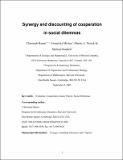Search
Now showing items 1-9 of 9
Evolution: Selection For Positive Illusions
(Nature Publishing Group, 2011)
Everybody knows that overconfidence can be foolhardy. But a study reveals that having an overly positive self-image might confer an evolutionary advantage if the rewards outweigh the risks.
Synergy and Discounting of Cooperation in Social Dilemmas
(Elsevier, 2006)
The emergence and maintenance of cooperation by natural selection is an enduring conundrum in evolutionary biology, which has been studied using a variety of game theoretical models inspired by different biological situations. ...
Prelife Catalysts and Replicators
(Royal Society, The, 2009)
Life is based on replication and evolution. But replication cannot be taken for granted. We must ask what there was prior to replication and evolution. How does evolution begin? We have proposed prelife as a generative ...
Originator Dynamics
(Elsevier, 2009)
We study the origin of evolution. Evolution is based on replication, mutation, and selection. But how does evolution begin? When do chemical kinetics turn into evolutionary dynamics? We propose “prelife” and “prevolution” ...
Direct Reciprocity with Costly Punishment: Generous Tit-for-Tat Prevails
(Elsevier, 2009)
The standard model for direct reciprocity is the repeated Prisoner's Dilemma, where in each round players choose between cooperation and defection. Here we extend the standard framework to include costly punishment. Now ...
Multiple Strategies in Structured Populations
(National Academy of Sciences, 2011)
Many specific models have been proposed to study evolutionary game dynamics in structured populations, but most analytical results so far describe the competition of only two strategies. Here we derive a general result ...
Competition-Colonization Dynamics in an RNA Virus
(National Academy of Sciences, 2010)
During replication, RNA viruses rapidly generate diverse mutant progeny which differ in their ability to kill host cells. We report that the progeny of a single RNA viral genome diversified during hundreds of passages in ...
Cooperate without looking: Why we care what people think and not just what they do
(Proceedings of the National Academy of Sciences, 2015)
Evolutionary game theory typically focuses on actions but ignores motives. Here, we introduce a model that takes into account the motive behind the action. A crucial question is why do we trust people more who cooperate ...
The organization and control of an evolving interdependent population
(The Royal Society, 2015)
Starting with Darwin, biologists have asked how populations evolve from a low fitness state that is evolutionarily stable to a high fitness state that is not. Specifically of interest is the emergence of cooperation and ...








